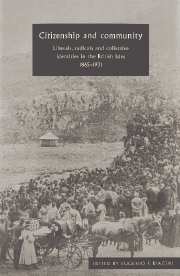 Citizenship and Community
Citizenship and Community Book contents
- Frontmatter
- Contents
- List of contributors
- Acknowledgements
- Introduction: Citizenship, liberty and community
- Part I Citizenship, populism and liberalism
- Part II Economic democracy and the ‘moral economy’ of free trade
- 6 The National Agricultural Labourers' Union and the demand for a stake in the soil, 1872–1896
- 7 Free trade, protectionism and the ‘food of the people’: the Liberal opposition to the Cattle Diseases Bill of 1878
- 8 Towards the ‘hungry forties’: free trade in Britain, c. 1880–1906
- 9 The strange death of free trade: the erosion of ‘liberal consensus’ in Great Britain, c. 1903–1932
- Part III Democracy, organicism and the challenge of nationalism
- Part IV Consciousness and society: the ‘peculiarities of the British’?
- Index
7 - Free trade, protectionism and the ‘food of the people’: the Liberal opposition to the Cattle Diseases Bill of 1878
Published online by Cambridge University Press: 16 September 2009
- Frontmatter
- Contents
- List of contributors
- Acknowledgements
- Introduction: Citizenship, liberty and community
- Part I Citizenship, populism and liberalism
- Part II Economic democracy and the ‘moral economy’ of free trade
- 6 The National Agricultural Labourers' Union and the demand for a stake in the soil, 1872–1896
- 7 Free trade, protectionism and the ‘food of the people’: the Liberal opposition to the Cattle Diseases Bill of 1878
- 8 Towards the ‘hungry forties’: free trade in Britain, c. 1880–1906
- 9 The strange death of free trade: the erosion of ‘liberal consensus’ in Great Britain, c. 1903–1932
- Part III Democracy, organicism and the challenge of nationalism
- Part IV Consciousness and society: the ‘peculiarities of the British’?
- Index
Summary
At the close of the parliamentary session of 1878 Joseph Chamberlain wrote to a Birmingham political ally: ‘I am glad to see that the session's work has not been altogether fruitless … Dilke and I together have had the real triumphs of the session’, primarily. Chamberlain considered, ‘in forcing the government to entirely change the cattle bill’. Why should the parliamentary Radicals see political advantage in attacking a bill designed to check the spread of cattle disease – a measure one might naturally assume to be the preserve of veterinary scientists and public administrators?
In fact, cattle disease legislation occupied a highly contentious position within the mainstream of political debate and party conflict throughout the mid- to late-Victorian period. Successive attempts at legislation, caused by recurrent outbreaks of cattle disease between the mid-1860s and the mid-1880s, provoked a vociferous clash between powerful and vested interests. On the one side were farmers, landlords and their county representatives who argued for a complete ban on the trade in imported livestock for domestic consumption as the only effective means to eradicate disease and enable an increase in domestic meat supplies. On the other side was the urban borough interest, comprised of groups directly connected with the foreign livestock trade – butchers, wholesalers and importers – and the wider community of poorer working-class consumers and their borough representatives, who interpreted the demand for prohibition of the trade as a return to protectionism and higher meat prices.
By the mid-1880s the contest had swung decisively in favour of the agricultural lobby.
- Type
- Chapter
- Information
- Citizenship and CommunityLiberals, Radicals and Collective Identities in the British Isles, 1865–1931, pp. 168 - 192Publisher: Cambridge University PressPrint publication year: 1996
- 1
- Cited by
